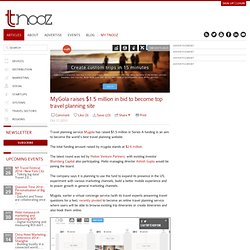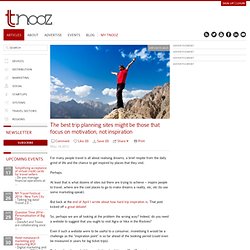

MyGola raises $1.5 million in bid to become top travel planning site. Travel planning service Mygola has raised $1.5 million in Series A funding in an aim to become the world’s best travel planning website.

The total funding amount raised by mygola stands at $2.6 million. The latest round was led by Helion Venture Partners, with existing investor Blumberg Capital also participating. Helio managing director Ashish Gupta would be joining the board. The company says it is planning to use the fund to expand its presence in the US, experiment with various marketing channels, build a better mobile experience and to power growth in general marketing channels. Mygola, earlier a virtual concierge service (with its travel experts answering travel questions for a fee), recently pivoted to become an online travel planning service where users will be able to browse existing trip itineraries or create itineraries and also book them online.
Co-founder and CEO Anshuman Bapna says: “Travel suffers from a blind-men-and-the-elephant problem. Create custom trips in 15 minutes. The best trip planning sites might be those than focus on motivation, not inspiration. For many people travel is all about realising dreams, a brief respite from the daily grind of life and the chance to get inspired by places that they visit.

Perhaps. At least that is what dozens of sites out there are trying to achieve – inspire people to travel, where are the cool places to go to make dreams a reality, etc, etc (to use some marketing-speak). But back at the end of April I wrote about how hard trip inspiration is. That post kicked off a great debate! So, perhaps we are all looking at the problem the wrong way? Even if such a website were to be useful to a consumer, monetising it would be a challenge as the “inspiration point” is so far ahead of the booking period (could even be measured in years for big ticket trips). Perhaps then the goal of these websites should be motivation not inspiration.
Because the site usage point will be during the booking period, product based monetisation may work (eg. selling travel services like flights, hotels, tours etc). So far so good. [Carnet de voyage 2.0] Travelavenue lève 500 000 euros. Le guide de voyage communautaire, TravelAvenue, vient d’officialiser un premier tour de table de 500 000 €, auprès de la Financière Boscary, Investir en Direct et de business angels, dont Jean-Fabrice Mathieu (Kelkoo, Seloger), Serge Alleyne (Nomao) et Andres Menajosky (Iando).
![[Carnet de voyage 2.0] Travelavenue lève 500 000 euros](http://cdn.pearltrees.com/s/pic/th/carnet-travelavenue-frenchweb-40459197)
Cette augmentation de capital doit notamment permettre à la société de développer ses actions marketing et d’étoffer son équipe, composée pour le moment d’une douzaine de collaborateurs. La start-up profite de cette annonce pour dévoiler une nouvelle version de son site, dont le coup d’envoi a également été donné aujourd’hui. Elle est présentée comme une synthèse « entre Pinterest et les sites de voyages traditionnels ». Lancé en 2010 par Loic Dupont, Travelavenue se présente comme un carnet de voyage virtuel construit pour aider les internautes à préparer leurs voyages plus efficacement. Disponible en 17 langues, Travelavenue aurait aidé plus d’1M de voyageurs a préparer leurs séjours en 2011. Social trip planner. The future of travel search lies on a Silicon Beach (not in a Valley) After more than 15 years of online travel, we are still looking for the perfect travel search engine.
But do four Australian startups hold the key to unlocking the future of travel search? I have written a number of stories on search and travel search (Question and Answer sites post here, future of general search post here). A theme in those posts is that searching for travel in 2012 is very similar to searching for travel in 2002. On the major online travel agents or metasearch sites you enter a starting point, destination and dates. The results are a list of flights. On the major/main search engines you type in a closed question (a question with a specific answer such as “cheap flights to bali”) and a list of sites is presented. There are some new wave product emerging such as Google Flight Search, but search continues to struggle to answer the open-ended question such as “where do I go next?”
This is the “fourth phase” of online travel that I have been talking about since 2007. Rome2Rio.